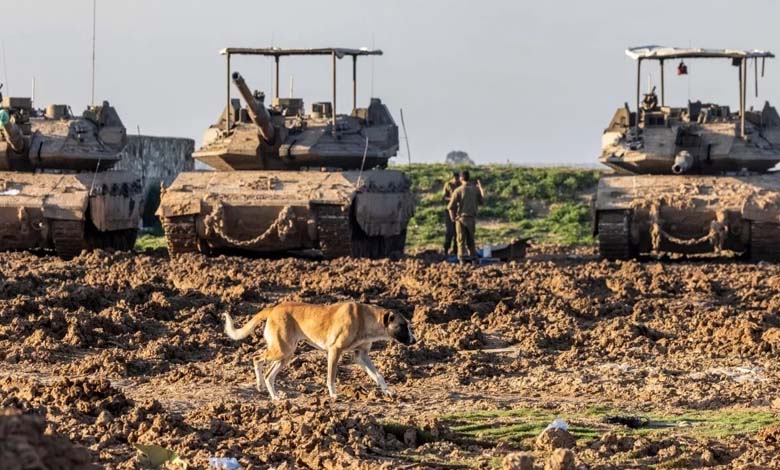Bodies devoured by stray dogs: “Tragedy” in northern Gaza described by Jabalia

Scattered bodies on dusty streets, devoured by stray dogs, completely destroyed roads, and people starving. This is the scene in Jabalia, northern Gaza Strip.
A scene described by Fares Afana, head of emergency services in northern Gaza, in a phone interview with CNN.
-
Number of Deaths in Gaza So Far: A Shocking Toll of the War
-
The “Buried” Nightmare in Gaza: A “Tip of the Iceberg” Awaiting the End of the War
Afana said: “You can see signs of hunger on the faces of people in northern Gaza. Israeli forces are destroying everything that represents life or signs of life.”
It wasn’t just hunger visible on the dead; Afana and his colleagues also witnessed animals scavenging the corpses of Palestinians killed in the area, complicating efforts to identify the deceased.
“Hungry stray dogs are eating these bodies in the street, making it difficult for us to identify them,” he added.
-
Disengagement from Gaza: Did Hezbollah accept in private what it publicly rejected?
-
Israel Suffers Losses in Northern Gaza After a Year of Fighting and Siege
The head of emergency services in northern Gaza shared an image with CNN showing the remains of a young boy, whose body, he said, was being eaten by stray dogs.

He also pointed out that thousands of children and pregnant women are trapped in the besieged area, where the Israeli army has launched air and ground attacks in three neighborhoods over the past 12 days.
The United Nations Office for the Coordination of Humanitarian Affairs (OCHA) reported on Sunday that at least 50,000 people had been displaced from the Jabalia area.
-
In Memory of the “Flood”: The War in Gaza Returns to Its Initial State
-
Rubble and Tombstones: “Unprecedented” Suffering in Gaza
About 400,000 people who remain in northern Gaza are suffering from hunger and facing ongoing Israeli bombardments.
The Israeli army claims it is targeting the renewed presence of Hamas there.
Starvation or displacement
The United Nations has accused the Israeli army of forcing northern Gaza residents to choose between “starvation or displacement.”
Philippe Lazzarini, Commissioner-General of UNRWA (the United Nations Relief and Works Agency for Palestine Refugees), said in a statement on Monday: “Civilians are given no choice but to starve or leave.” He added: “In Gaza, many red lines have been crossed. What may constitute war crimes can still be prevented.”
According to Afana, Israeli forces opened fire on Monday on starving residents searching for food at a UNRWA aid center. He warned that “the situation is getting worse.”
UNRWA had reported that an artillery strike on its food distribution center in Jabalia on Monday killed at least 10 people and injured 40 others.

Difficulty of access
Regarding the mobility of paramedics in the area, Afana noted that it is extremely dangerous to reach the region “due to the bombed roads and direct gunfire from the Israeli army at our vehicles.”
-
Can Biden Succeed in Stopping the Gaza War? An American Newspaper Responds
-
“The Island”… What do we know about Israel’s latest plans for northern Gaza?
He added that “ambulances were hit by shrapnel from Israeli artillery strikes near the Yamen Al-Saeed hospital in Jabalia.”
“What is happening in northern Gaza is real genocide. We cannot do our work normally,” he said.
Ashes
Vast areas of the once-vibrant Jabalia refugee camp have been turned into a maze of destroyed streets by Israeli bulldozers, according to a resident of the besieged neighborhood.
-
After new demands from Hamas and Israel’s intransigence… have the Gaza truce negotiations stalled?
-
Washington Pushes for the Deployment of Peacekeeping Forces in Gaza Ceasefire Arrangements
Abdul Karim Al-Zuwaidi, a 23-year-old Palestinian, told CNN in a voice message on Tuesday: “The scenes, the sounds, and the smell of the invasion are extremely violent.”

He added: “The question is: where and how can people leave?” The only place they remain, despite all the destruction, consists of simple tents they’ve set up from the rubble of their homes. Where can people go?”
Al-Zuwaidi accused the Israeli army of firing on civilians trying to flee the north at the Abu Shreikh roundabout in Jabalia, as earlier reported by CNN and others.
-
In Gaza… medicine is a rare commodity… and polio is a looming threat
-
Gaza Negotiations: 7 Arduous Hours
He recalls that before the war, children would line up in the alleys of the Jabalia refugee camp, and families would gather to celebrate holidays, including the month of Ramadan.
“The Jabalia camp was so beautiful, filled with local markets and bustling with people. It was safe. Now, the camp is nothing but ashes,” he concluded.












